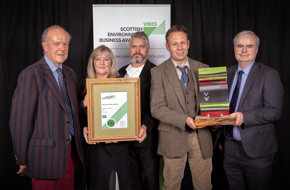Highlights
- Development of an international barley hub for research into impacts of climate change on
the barley crop. - Mitigating risk of climate change to own assets including:
- Magic margins - textured surface at field margins to slow field run-off, reducing erosion, preventing potential pollution and
encouraging biodiversity - Woodland planting and hedging to promote biodiversity, shelter crops and protect polytunnels from high winds
- Contoured drilling across slopes to encourage infiltration and further reduce the impact of heavy rains
- Biodiversity Action plans and replacing fossil fuel energy with renewable sources
- Magic margins - textured surface at field margins to slow field run-off, reducing erosion, preventing potential pollution and

The James Hutton Institute is a world leading scientific organisation that undertakes research for customers including Scottish and UK Governments, the EU, Industry and other key organisations worldwide. They combine strengths in crops, soils and land use and environmental research, and make major contributions to the understanding of key global issues. The Institute has undertaken a number of studies and practical steps in sustainable farming and adaptation to climate change.
The Climate Change Adaptation award recognises businesses and partnerships that are taking a proactive approach to managing climate risks and/or developing products and services that are enabling society to adapt.
The judges felt that the James Hutton Institute demonstrates a forward thinking approach of bringing together stakeholders from across the supply chain to develop a sustainable future for barley production and associated industries. The on-site innovations such as Magic Margins demonstrated environmental benefit and this approach has been shared widely to enable others to adapt them. The judges considered that The James Hutton Institute were worthy winners of this award.
The Institute recognises that its greatest climate change risk is to its farms and other research facilities. They have implemented various measures to protect these assets, including:
- Magic margins - textured surface at field margins to slow field run-off, reducing erosion and preventing potential pollution caused by heavy precipitation
- Hedging to protect polytunnels from high wind
- Contoured drilling across slopes to encourage infiltration and further reduce the impact of heavy rains
- ‘Tied ridges’ in potato fields
The Institute demonstrated their commitment to climate change with their investment in renewable technologies. They invested in a wind turbine, 200KW solar panels and are developing a much larger 1MW solar meadow and a sewage waste heat recovery system at its two key sites.
"The Institute is the primary partner in the development of the International Barley Hub, which is seeking to understand the impact of climate change on barley crops and develop a resilience and sustainable barley crop for the future uses in Scotland. Barley is Scotland’s most valuable cereal crop with a number of industries reliant on barley production/yield. Scotland currently does not have enough barley grown in the country to meet the demand and given climate change, it is important to increase the resilience of this crop now and in the future. The judges was impressed that the International Barley Hub brings together the entire barley supply chain with currently 135 stakeholders and 40 partners involved, including brewers, distillers and farmers." - Professor Colin Campbell, CEO of The James Hutton Institute